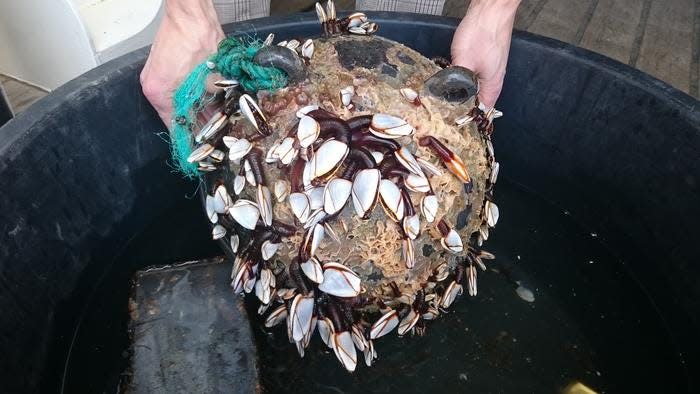Should we clean up the trash in our oceans? New study has a controversial answer.
The world's oceans and waterways are littered with millions of tons of plastic pollution – but scientists in a study released Thursday say we should think twice before cleaning them up.
In fact, the scientists warn against using any mechanical cleanup devices to address global plastic pollution. It's a controversial and thought-provoking finding amid efforts to clean up trash littering the world's oceans.
That includes cleaning the Great Pacific Garbage Patch, an infamous collection of trash between Hawaii and California that has spurred on the "Ocean Cleanup" project, which uses mechanical means to corral the debris.
Where should ocean cleanup efforts focus?
Study co-author Richard Thompson of Plymouth University in the U.K. told USA TODAY we should focus 95% of our attention and energy on reducing the flow of plastic trash into the ocean and only 5% on cleanup.
"At the moment, plastic debris is entering the ocean at a rate far faster than any feasible cleanup," Thompson said. "There is a risk that focusing on cleanup will distract attention from the real priorities.
"If we focus on cleanup as a solution to plastic pollution, we condemn future generations to continue contaminating the environment and cleaning up as an afterthought."
Study lead author Melanie Bergmann, a marine ecologist at the Alfred Wegener Institute in Germany, used this analogy: "When the bathtub is overflowing, you first turn off the tap before you mop the floor," she told USA TODAY.

Global treaty would reduce plastic production
In the study, which appeared in the journal One Earth, the scientists say that with plastic production projected to triple by 2060, "the most cost-effective and efficient way to prevent further pollution is to reduce plastic production and consumption," according to a University of Plymouth statement.
The study has been published as world leaders prepare to resume discussions on the United Nations Global Plastics Treaty at the upcoming third meeting of the Intergovernmental Negotiating Committee on Plastic Pollution.
"A plastics treaty should foremost reduce plastics production," Bergmann told USA TODAY. "The science shows that this is the most effective and economic lever to reduce plastic pollution."
In the study, the scientists also say the environmental costs of leaving plastic pollution in the ocean should be weighed against the full environmental and economic cost of plastic removal technologies. They call for clear criteria for such judgments to be incorporated into the treaty, the University of Plymouth statement says.
Surprise find: Marine animals are thriving in the Great Pacific Garbage Patch
Don't rely on mechanical means, study says
Researchers caution that plastic removal technologies so far have shown mixed success in the amount of waste material they are able to collect, and many have not been tested at all.
"In fact, some have been shown to harm quantities of marine organisms – including fish, crustaceans and seaweeds – that far exceed the amount of plastic captured, meaning their overall impact on the ocean is potentially more harmful than helpful," the University of Plymouth said.
"My team tested one type of cleanup device here in Plymouth and showed it removed mainly seaweed and that it captured fish and other marine creatures, which were dead when the device was emptied," Thompson said.
"One type of cleanup I do encourage is hand-picking, for example, from beaches," he said. "This can be very effective, and if volunteers take part this helps to raise awareness."
What does the Ocean Cleanup team say?
The Ocean Cleanup team does not agree with the findings of the study.
"The Ocean Cleanup is a proud contributor to the global treaty to end plastic pollution," the group said in an e-mail to USA TODAY. "And the part we play is positioned on one end of the pollution equation. To achieve the treaty goal, we need to work on both ends of the equation in parallel: reduce production and remove mismanaged waste (aka "pollution").
"Only focusing on either end of the equation will not end plastic pollution."
According to Ocean Cleanup, cleaning the oceans is essential because plastic ocean pollution does not disappear once the world manages to halt plastic emissions into the ocean. It is persistent for decades, maybe even centuries, and, due to fragmentation into smaller particles, becomes more harmful the longer it remains in the ocean.
"To avoid having to continue cleaning in perpetuity, however, the supply side of the problem needs to be addressed as well. The Ocean Cleanup aims to be a temporary effort, with the ambition to reduce floating ocean plastic pollution by 90% by 2040. We will cease to exist once our mission of clean oceans has been achieved.
"We believe and are working to provide proof that the cost of inaction is significantly higher than the cost of the cleanup," the group said.
This article originally appeared on USA TODAY: Ocean pollution study: Pick up trash on the beach, not in the sea

